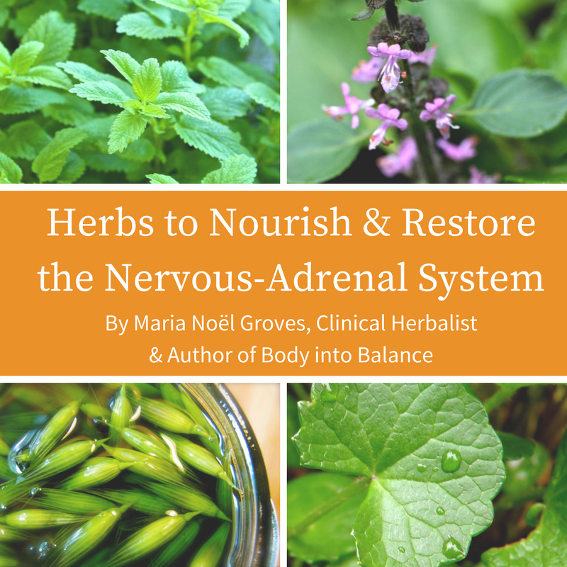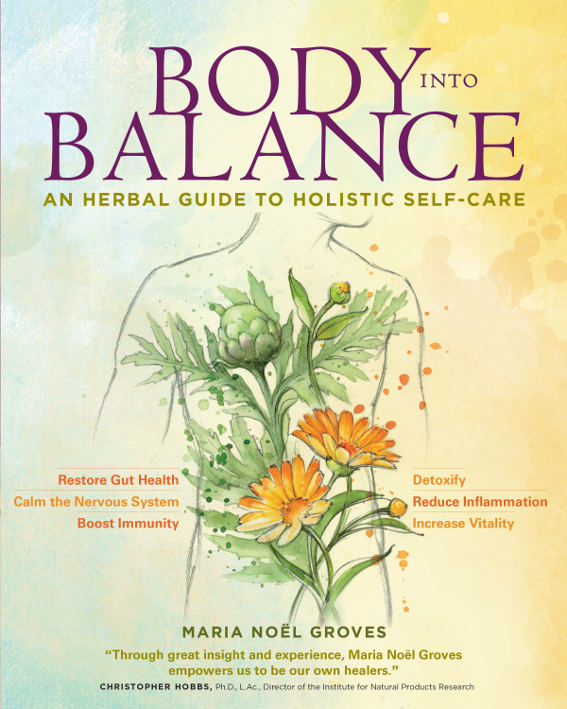Get weekly tips, recipes, and my Herbal Jumpstart e-course! Sign up for free today.

Herbs to Nourish and Restore the Nervous-Adrenal System
By Maria Noël Groves, Clinical Herbalist & Author of Body into Balance
Share this! |
|
Raise your hand if stress doesn’t affect you at all. Now, I’m guessing you’re not waving your hand in the air... unless it’s to sway a white flag. The truth is that stress is unavoidable. While some amount of stress in life is normal and healthy, in America we tend to experience so much stress that it puts is in a chronic state of fight or flight. Not only does stress create tension and discomfort, chronic stress also negatively affects almost every aspect of our health and wellbeing.
Side Effects of Stress
Here are just a few ways in which chronic stress can wreck your overall health and wellbeing:
- Stress hormones, including adrenaline and cortisol, are produced when you’re in the fight or flight stress state, also known as the sympathetic nervous system response. These hormones can directly affect metabolism, the respiratory system, cardiovascular health, mood, and more. Digestion, immune health, detoxification, and wound healing and connective tissue integrity get put on hold while your body fights the perceived threat.
- When your adrenals pump out abnormally high levels of cortisol, it does so by transforming other hormones like progesterone into cortisol and taking the building blocks away from estrogen, testosterone, and DHEA production. This can lead to an imbalance of reproductive hormones which, in turn, has implications throughout the body. Elevated stress hormones also throw off thyroid hormones.
- Cortisol tells your body to pull sugar from storage and into your bloodstream because it thinks you need the fuel to fight or flee. Even if you’re not eating a lot of sugar and carbs, high cortisol levels can make your blood sugar higher than it should be, which over time can lead to insulin sensitivity, type 2 diabetes, weight gain (especially around the abdomen), and cardiovascular disease.
- Cortisol also inhibits the body’s ability to down-regulate inflammation, so with each passing day your inflammatory response goes up and up. This can increase pain and disease risk, increase the likelihood of depression, aggravate autoimmune disease, and impair cognitive abilities.
Natural Stress Relief Measures
Ideally, we should manage our stress through a healthy, nutrient-dense diet and good lifestyle habits, including regular exercise, adequate sleep, and mind-body activities like meditation, yoga, deep breathing, or tai chi. Long term, these are the go-to goals. But in the short term, you can use herbs to help bring you down a notch, improve the body’s response to stress, and rewire your system to a better reality. Enter nervine and adrenal herbs.
While some people call any herb that affects the nervous system (even coffee) a nervine, I’m using this term to refer to herbs that nourish, soothe, and support a healthy nervous system. These herbs often help bring us out of that sympathetic stress state and into the parasympathetic “rest and repair” nervous system state, or at least somewhere in between. Adaptogens help by modulating stress hormones and often providing a deeper sense of energy than you would get from an overt stimulant (like coffee), ultimately helping your body adapt to stress. I particularly like the adaptogens that have a calm energy effect, which means they may also decrease anxiety and improve sleep quality.
Herbal Stress Relief
Here are some safe and effective herbs for stress relief.
Milky Oat Seed (Avena sativa)
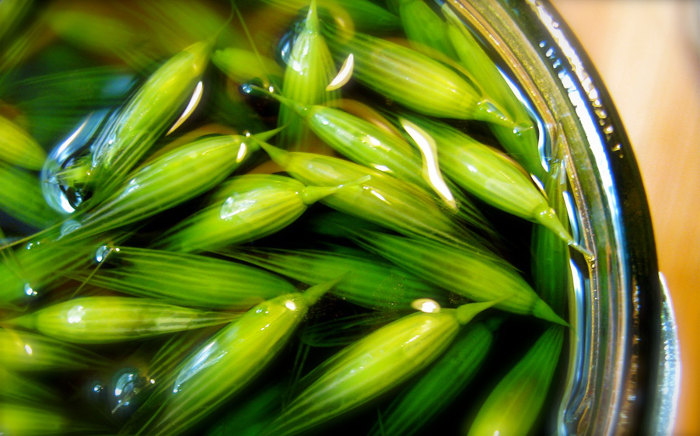
This is the classic nervine! Use the seeds of the oat plant before they transform into the grain state; when you squeeze it, it oozes a milky latex that is the primary nervous system medicine of this plant. Think of milky oat as a nourishing tonic for the nervous system. It’s best taken in relatively high doses daily (a teaspoon of tincture isn’t unreasonable) for weeks or months so the effects can gradually build. Consider it when you’ve got frayed nerves, feel wired yet tired, anxious... basically any time of depletion or overstimulation.
Interestingly, milky oat seed also has the reputation to ease withdrawal symptoms from various drugs, including opioids. While you could make a tea with dried milky oat tops, the active alkaloid component in the seed is dramatically diminished upon drying. Both alcohol and vinegar extract it well, so a fresh plant tincture or vinegar extract is preferred; glycerites are also available on the market. It’s easy to make your own. You can buy organic oat seeds from seed suppliers that sell it as a cover crop. Check it regularly as the seeds form because they’re only in their milky stage for a short time. Strip the seeds off the plant, fill your jar, cover with alcohol or vinegar, then whir it in a blender to make a sludge. I learned the blending trick from jim mcdonald – it makes a profoundly more potent extract. Strain this out after about one month, and you’ve got your medicine! Shake before using.
Milky oats blend well with all the other herbs discussed here and are a popular base for ADHD blends for children. This is an extremely safe herb, even for children, pregnancy, and nursing, but do not use it if you have an oat allergy or have noticed that your gluten sensitivity is aggravated by gluten-free oatmeal.
Lemon Balm (Melissa officinalis)
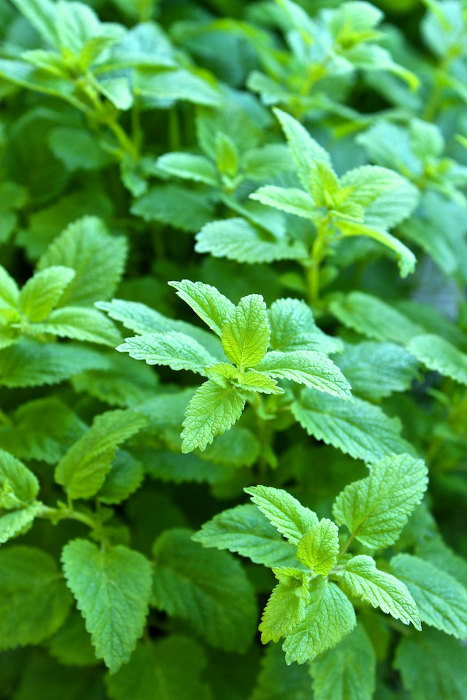
This popular perennial garden herb offers nervine and mildly sedating properties while also uplifting and increasing focus – a nice mix of activities! Unlike some other calming herbs, it’s not going to put you to sleep in the middle of the day or aggravate depression. In fact, it helps lift mild cases of depression when used solo or combined with St. John’s wort tincture.
As a mild bitter and relaxing herb, it’s great for sluggish and nervous indigestion. Lemon balm also eases stress, anxiety, or hyperthyroid-induced heart palpitations. Preliminary studies suggest that lemon balm inhibits the autoimmune activity of Graves hyperthyroid disease (where it is often combined with motherwort and bugleweed fresh plant tinctures).
You can use lemon balm as a fresh plant or recently dried in tea or as a fresh plant tincture. Though the fresh plant is more potent, the dried herb makes an easy addition to tea blends. I combine it with equal parts skullcap, passionflower, and spearmint to make a sleep tea. Or blend it with holy basil and perhaps a sprinkle of rose petals for general nerve and stress support.
As a side benefit, lemon balm also has direct anti-herpes (and potentially anti-influenza) activity, particularly when applied topically at the first sign of an outbreak but also when taken internally. Studies used the essential oil mixed in cream, but true lemon balm essential oil is extremely expensive. I get great results with a fresh plant tincture. I prefer a fresh 1:2 tincture in 95% alcohol though vodka also works, dosed 1-2 ml as needed, and I always keep the dried herb on hand for tea. Use aerial parts when they look happy and smell good, whether or not they are in flower.
Lemon balm is extremely safe, even for children, in pregnancy, and while nursing. Although some theorize that lemon balm may aggravate hypothyroid disease, this is highly unlikely and rare.
Holy Basil (Ocimum sanctum, syn. O. tenuiflorum)
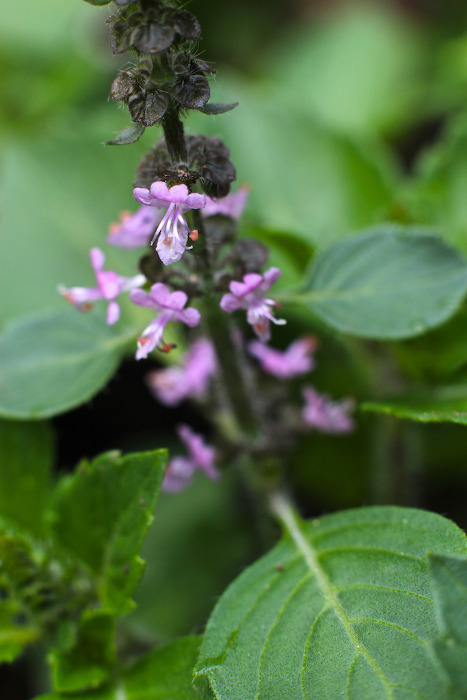
Also called tulsi, this herb comes in many varieties. I tend to use “kapoor” tulsi because it’s the most productive in the garden; cultivate like regular basil (rich soil, full sun, warmth, good drainage, regular moisture). If your seed supplier doesn’t specify the variety, it’s probably kapoor. Although kapoor is not considered the most potent variety, I still get great results from this herb personally and with my clients.
You can use the leaves and flowers fresh or dry in pretty much any format. This is a lovely and adaptable herb! It is a calm-energy adaptogen and nervine that specifically balances cortisol to bring it to healthy levels. It’s also a highly aromatic mint-family herb with notes of mint and clove. So, it’s not surprising that tulsi relieves stress, calms anxiety, helps us through the grief process, provides deep energy, reduces blood sugar and sugar cravings (especially when stress induced), improves cognitive function, and decreases inflammation.
In India, holy basil is planted in pots in temples and is used as a great protector: it strengthens digestive function, protects against ulcers, and helps defend the body against germs and even radiation. Sipping a cup of holy basil tea feels like a good yoga class or mediation – you’re Zen-like afterwards.
Follow the same dosage recommendations as for lemon balm. It’s generally very well tolerated, but don’t use in pregnancy without supervision. Commercial dried holy basil can be lackluster quality.
Gotu Kola (Centella asiatica)
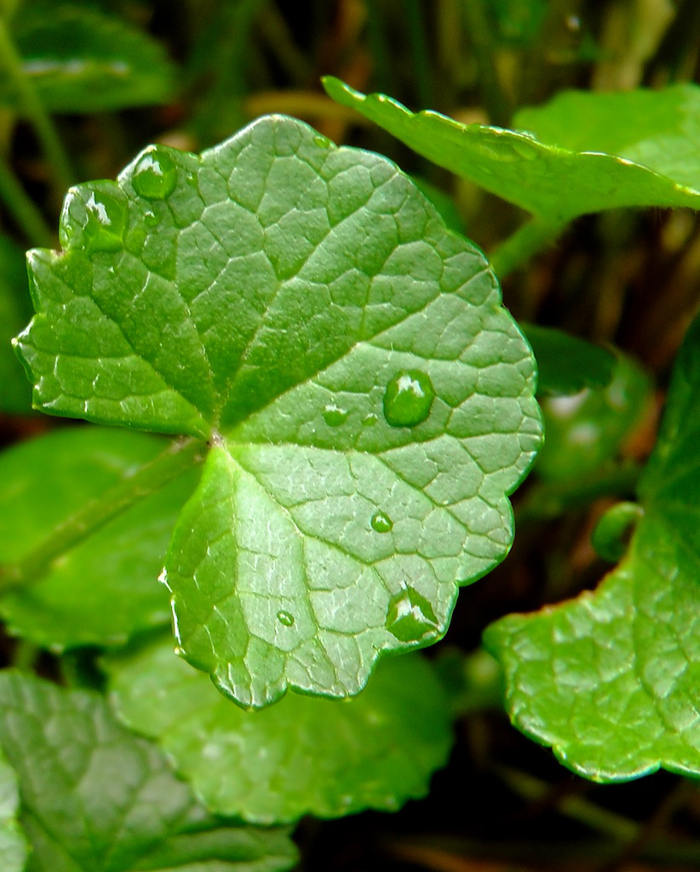
This Indian herb is sometimes called brahmi, a common name it shares with Bacopa monnieri. It’s a creeping groundcover that sends off runners like strawberries and spider plants; these shoots will root into new plants if they’re left in water or soil.
It’s easy to cultivate gotu kola indoors or out but is finicky about its conditions: it prefers lots of warmth, extremely rich soil, and daily watering. In India, its preferred growing environment is sewage sludge.
It’s another calm-energy adaptogen, though, like milky oat, its effects build over time and are not always immediately apparent. It has a long history of use as a nerve restorative and cognitive herb, and preliminary research supports its use, including its ability to improve memory and brain function and protect against and heal from the effects of mental decline and trauma, including stroke and brain injury.
Besides its ability to ease anxiety, stress, and mental confusion, gotu kola has amazing abilities to heal various types of tissues in the body. Alongside its healing effects for the nerves, it also improves blood flow and capillary and blood vessel strength and integrity. Therefore, you’ll find it in formulas for varicose veins, hemorrhoids, vascular skin conditions, heart health, and vascular insufficiency. It also improves the healing and integrity of connective tissue, with studies supporting its use in healing ulcers (consider it also for leaky gut), gingivitis, and wounds. You can deliver it directly to the area affected and also take it internally.
This is a very safe plant, but it may inhibit conception and fertility. Most of the concerns with gotu kola stem from poor quality products: adulteration causing liver toxicity and poor growing conditions leading to E. coli contamination. Buy from certified organic, trustworthy suppliers or grow it yourself. It’s difficult to grow from seed but easy to propagate from shoots or root division. You can tincture it fresh (1:2, 95%), dry (1:5, 50-60%), eat it as a leafy green, juice it, make tea, or even throw it in your soup and bone broths.
To learn more about these herbs and others that support nervous-adrenal health, visit http://wintergreenbotanicals.com/classnotes/ or check out my book at http://wintergreenbotanicals.com/book/
Read an extensive review of Body into Balance here.
Maria Noël Groves, RH (AHG), author of Body into Balance: An Herbal Guide to Holistic Self Care, is a New Hampshire-based registered clinical herbalist and freelance health journalist nestled in the pine forests of New Hampshire. Learn about herbs, the book, distance consults, online classes, and more at www.WintergreenBotanicals.com.

Rosalee is an herbalist and author of the bestselling book Alchemy of Herbs: Transform Everyday Ingredients Into Foods & Remedies That Healand co-author of the bestselling book Wild Remedies: How to Forage Healing Foods and Craft Your Own Herbal Medicine. She's a registered herbalist with the American Herbalist Guild and has taught thousands of students through her online courses. Read about how Rosalee went from having a terminal illness to being a bestselling author in her full story here.
